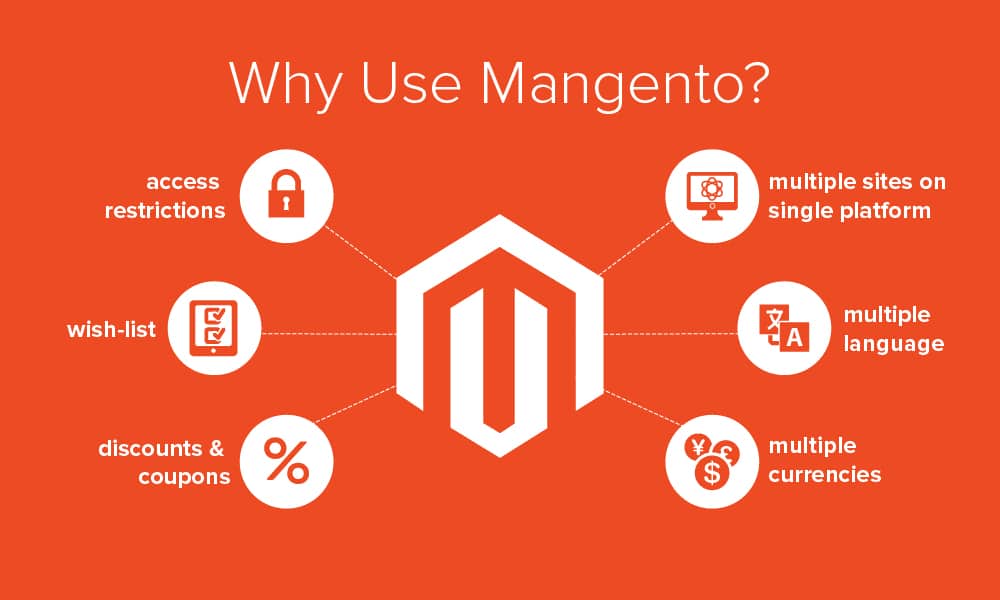Best and Cheap Magento 2.3.0 Hosting Big Deal 15% Off
What is Magento?
Magento Commerce is the leading provider of open omnichannel innovation. Magento open source digital commerce platform and cloud-based omnichannel solutions empower merchants to integrate digital and physical shopping experiences.
Magento is one of the best options and here’s why: In today’s world, where everyone is connected to the web – if you’re not online, the chances are high that your store will remain unknown. Unless you are selling bread and milk, you should probably consider an online store for your products.
Unlike a normal store, an online store gives you great visibility to a very broad range of customers. Online, you can sell locally, nationally and, why not, internationally.
Proprietary Platform
While this solution offers a platform perfectly tailored to your needs without any other bulk and no limitations, this option is usually high-cost, high-maintenance and time-consuming.
If you were to build such a platform, it would take you a good two-to-three months to have it up and somewhat bug-free. If you were to hire someone to do this for you it would cost you somewhere from $3,000 and up, depending on what you want and need.
Open Source
Magento is a free ecommerce platform released under Open Source License ver 3.0 and built using PHP and other open source tools. By using these technologies and remaining open source means that Magento as a platform has several distinct advantages over the competition. The Platform is highly adaptable and could be modified endlessly to exactly fit project requirements.
Using open source tools also means that the platform guarantees a robust performance and enhanced security for merchants and developers.
Custom Designed for Ecommerce
These days all major CMS’s including WordPress, Drupal and others offer ecommerce capabilities (right out of the box in some cases!), they are designed with an ecommerce-only approach.
Thus Magento powered ecommerce solutions offer a better experience to everyone from the developers to the store administrators to end users who come to shop at the storefront. Over years, Magento has evolved into a feature rich ecommerce solution that comes prepackaged with all the essential tools needed to build up an ecommerce web store.
The Magento Community
Where there is an open source app, there is a community!
Since Magento is a very popular open source ecommerce platform, there is a huge community of store owners, merchants, developers, designers, agencies, ecommerce consultants, tech solutions providers, and general end users around the globe who discuss everything Magento in great details. The community ensures that the platform remains up-to-date, fast, reliable, secure and free from bugs. The good thing about this community is the very welcoming nature that makes every newcomer feel right at home.
No Hosting Related Restrictions
Unlike Shopify and Volusion (the “made for ecommerce” platforms), Magento allows you to choose the hosting solution of your choice. This way you could select the best hosting solution provider that fits your requirements and your budget. Similarly, when it is time to migrate your store, there is no restrictions on when and where you could host your store.
Default Responsive Design
The share of mobile devices in global ecommerce transactions is rapidly growing and soon it will surpass all other device classes. Realizing this, Magento incorporates HTML5 capabilities, ensuring that the storefront has a responsive design that caters flawlessly to mobile devices. In addition, Magento offers features such as Griding, image scaling, AV capabilities, gesture controls, drag-and-drop, etc.
Third Party Components Integration
Third party plugins and extensions greatly ease out the lives of Magento store administrators and developers. Magento offers limitless and restriction free integration of all third party components, thereby shortening the development and deployment timeframes considerably.
The good thing is that many of these components are free to use. Others are available for just a couple of dollars.
With the help of extensible API in Magento, you can connect to any application or any plugin of your choice without any hurdles. Whether it’s a payment gateway, an analytics tool or shipping, and tracking method, you only need to find the best extension and plug it into your Magento store within no time.
Magento Extensions & Customization Options
Every industry has its own ecommerce store design conventions. What works for fashion & apparel may not work for a furniture retailer. Similarly size, scale of operations, customer support requirements, billing and delivery options, etc. pose various challenges in the ecommerce environment.
Magento is a highly customizable ecommerce platform. It allows you to develop incredible frontend user experiences by editing layouts and templates or add new colors and styles of your choice. Backend refinements can also be redesigned to fulfill business requirements by rewriting code, modifying events and grids.
One of the key points of interest for all Magento users is the vast marketplace of extensions and modules. Magento users can discover multiple extensions effortlessly to extend and customize their stores and distinguish their storefront from the competitors’ by utilizing different augmentations.
Fast & Scalable
When it comes to page load speed, Magento is a clear winner!
Slow loading online stores go down very quickly. In many cases, the loss from slow pages is permanent and greatly contributes to the demise of the business. Magento with high-end caching technologies such as the Cloudways Full Page Cache and other database optimization techniques such as Memcached and Redis speed up the stores considerably.
Magento is suitable for small to large (and even huge) ecommerce stores simply because it’s flexible enough to grow with your business. In fact, Magento might surprise you with its performance, stability, and reliability.
Multiple Stores
Many ecommerce platforms let you have a single store per account. With Magento, you can setup multiple stores that could be managed through a single backend. You can control stores’ inventory, orders, billing, customer information, using a single admin panel.
Each store can have different themes and templates associated with them. You can also assign a subdomain for individual stores. The ease of controlling all of the stores simultaneously through a single admin panel greatly simplifies management and administration of multi-stores that operate in a single or multiple categories.
What’s New in Magento 2.3.0?
Highlights
Magento Open Source 2.3.0 includes a wealth of new features as well as hundreds of enhancements and fixes to the core product. Look for the following highlights in this release:
Merchant tool enhancements
- Inventory Management (provided by Multi Source Inventory (MSI)) is now available with Magento 2.3.0. It lets merchants manage inventory for all product types in a single warehouse and across complex shipping networks. Merchants can manage these locations as sources, tracking on-hand inventory quantities per product. Stocks map these sources and sales channels (websites) to provide an accurate, salable quantity as inventory pools for concurrent checkout and product reservations. Inventory Management also updates order and shipment options, giving you full control over your stock.
MSI is a Magento Community Engineering special project open to contributors. To take part and contribute, see the MSI GitHub repository and wiki to get started.
Improved developer experience
- PWA Studio is a set of tools that support the development, deployment and maintenance of progressive web applications.
- Declarative schema simplifies installation and upgrade procedures for Magento and extensions. Declarative schema reduce the need for many database scripts, eliminating the need to maintain these scripts. And here’s a big advantage: This features enables Magento to roll out database schema changes in patch releases (not currently possible). This feature supports split and shared database structures and database structure validation.
- GraphQL API is now available with Magento 2.3.0. This API provides an alternative to REST and SOAP web APIs for custom frontend development, including headless storefronts and PWAs. GraphQL is a Magento Community Engineering special project open to contributors.
- Asynchronous Web APIs allow any previous Magento REST APIs to be called asynchronously. This community-contributed feature includes separate status APIs that have been created to check the status of each request. Developers can now use the asynchronous APIs in conjunction with queues that have also been migrated to Magento Open Source.
- Bulk Web APIs allow all existing REST APIs to accept payloads with multiple entities. These community-contributed bulk APIs support more efficient and scalable implementations that eliminate round-trip network overhead. Like asynchronous APIs, bulk web APIs can be used in conjunction with queues that have also been migrated to Magento Open Source.
- Updates to Magento’s tech stack (including upgraded PHP support to maintain PCI compliance) include upgrades to Redis, MySQL, Elasticsearch, compatibility with PHP 7.2.x.
Substantial security enhancements
- Over 30 security fixes to core Magento code
- Cache flush ACL provides granular access to cache management settings to prevent accidental changes that could potentially affect system performance. This ACL also lets merchants control which administrative users can clear site caches.
- 2FA/CAPTCHA protects the Admin panel against stolen passwords and affects stores against bots.
Core bundled extension enhancements
Amazon Payments
- Added branding to the Amazon Pay configuration section in the Admin
- Improved extension architecture and performance
dotmailer
- dotmailer now supports the Magento Commerce split database mode.
Klarna
- Added descriptive text to the Refund API call
- Added a link to the Klarna merchant portal
- Added a detailed Klarna message in the Magento Admin where needed
- Added an initial Magento Functional Test Framework (MFTF) test and support for future tests
- Extended cleanser filtering
- Added support for PHP 7.2 and dropped support for PHP 5.6
Magento Shipping
- The Magento Shipping Click & Collect feature offers merchants the ability to:
- Provide Click & Collect as a shipping option to customers, enabling them to directly collect shipments from designated source locations or stores
- Configure source locations available for Click & Collect pick-ups
- Updates to Shipment Form for UPS (U.S. only)
- Customers can also select Click & Collect locations during checkout. This feature is supported by workflows and notifications for Click & Collect pick up, packing, and collection.
- The batch details page now displays collection point addresses, as applicable
- Activation notices can now be translated.
- Tracking popups for multi-package shipments are now displayed.
- The dispatch details page has been enhanced.
Vertex
- The Magento implementation of Vertex now supports Vertex O Series 7.0.
Other improvements
- Elasticsearch support for Magento Open Source version. Elasticsearch support was previously provided in Magento Commerce only.
- Improvements to release packaging plus an increase in test automation, results in a faster, more efficient release process and improved product quality.
- Upgrade of Magento Functional Test Framework (MFTF) to 2.3.6.
How to Choose The Best and Cheap Magento 2.3.0 Hosting?
How to choose the best and cheap Magento 2.3.0 hosting? Choosing the best and cheap Magento 2.3.0 hosting is not a simple task especially with low price offers. You need to take a large number of factors into consideration, including the Magento 2.3.0 compatibility, usability, features, speed, reliability, price, company reputation, etc. Therefore, we have established this Magento 2.3.0 review site, which is designed to help you find the best and cheap Magento 2.3.0 hosting within minutes, based on our specialized editors’ Magento 2.3.0 hosting experience and real customers’ feedback.
Best and Cheap Magento 2.3.0 Hosting
ASPHostPortal.com

ASPHostPortal.com claims to be proud of their management staff who have years of experience working in the web hosting industry. ASPHostPortal’s aim is to offer the best web hosting value to their clients by offering products and solution in an efficient and effective way. The ASPHostPortal.com’s hosting platform on Windows Server is compatible with Magento 2.3.0 hosting. Of course, you can feel very comfortable with their hosting service. Their best and cheap Magento 2.3.0 hosting plan is starting from $3.81/mo only. And with their promo code, you can get free domain too. Not only that, they also offer 30 days money back guarantee. Their servers are 99.99% uptime, it is important thing that you need for your Magento site, so your site is never down.
ASPHostPortal.com provides Magento-optimized managed hosting solutions for online merchants of all sizes. Since 2008, they’ve been committed to delivering superior performance, reliability, security, and support to their clients. Every Magento hosting deployment is engineered from the ground up to be responsive, scalable, and cost-effective.






